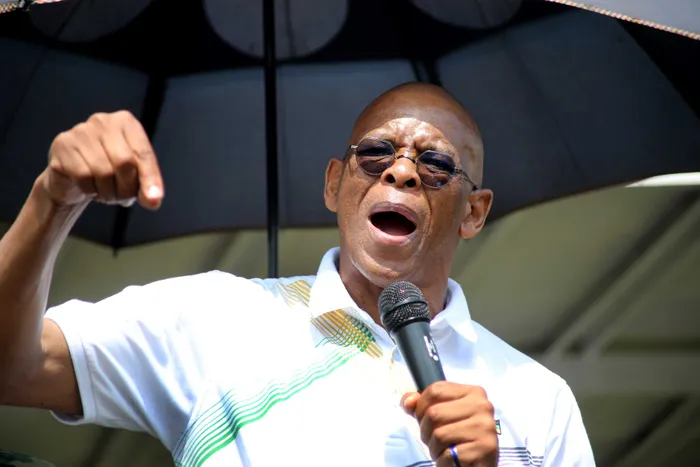ANC’s ‘politically flawed’ decision may spur realignment of the Left

Picture: Timothy Bernard African News Agency (ANA) - Former ANC secretary-general Ace Magashule was this past week expelled from the ruling party. The author writes that the timing of the decision to expel Magashule was wrong.
By Professor Bheki Mngomezulu
In 2021, the ANC suspended Ace Magashule from his position as the party’s secretary-general, but not as an ANC member. The decision was triggered by several charges that were preferred against him – including corruption, money laundering and fraud.
These charges related to the notorious asbestos scandal for which Magashule was charged and released on bail of R200 000 bail in November, 2020. Magashule’s suspension was in line with the ANC’s “step aside” resolution taken at the party’s elective conference in Nasrec in December, 2017.
To make matters worse, in a letter dated May 3, 2021 Magashule informed President Cyril Ramaphosa that he was suspending him from the ANC following the Phala Phala farmgate saga. The ANC did not recognise this suspension letter on the grounds that Magashule had failed to secure permission from the ANC’s national executive committee (NEC) to do so.
These two incidents have since culminated in Magashule’s complete expulsion from the ANC, not just from his position as secretary-general.
In a letter dated June 12, 2023 the ANC confirmed that its national disciplinary committee (NDC) had resolved to expel Magashule from the party. The NDC accused Magashule of contravening rules 12.1 and 12.2.20 of the ANC’s constitution, which recognises the NEC as the highest decision-making body between elections and outlines its rights and responsibilities.
They also accused Magashule of contravening rules 25.17.3 and 25.17.12, which focus on different types of misconduct that are punishable. After failing to explain within seven days why he should not be expelled from the party, the NDC subsequently confirmed Magashule’s expulsion from the ANC.
From a legal perspective, the ANC acted within the confines of the law.
It followed the prescripts of its constitution in arriving at this decision. Therefore, those who confine their analysis to the legal praxis would be vindicated by this trajectory when supporting the NDC’s decision.
However, four questions arise from this chain of events. The first is: did this NDC decision make political sense? Second, was the timing of the decision appropriate? Third, when looking into this matter from a broader context was Magashule being justifiably subjected to the ANC’s constitution or is there more to his expulsion than meets the eye?
Fourth and most importantly, how will this decision impact the ANC in 2024?
Each of these questions is worth ventilating.
On the first question, the decision was legally sound but politically flawed. For a party that is in the process of rebuilding itself with so many challenges, it does not make sense why it was necessary to add yet another problem when there was no urgency to do so.
The NDC’s letter should have first asked Magashule to explain why he should not be “suspended” from the party. Once this step had been passed, only then would it have been politically sound to ask him why he should not be “expelled”. Jumping to his expulsion is politically questionable.
The timing of the decision to expel Magashule was wrong. General elections are set to be held next year. It is an irrefutable fact that the ANC’s support has been on a downwards spiral although it remains the most supported party compared to all the others. Since it is not only ANC members who vote for the party, upsetting the electorate on the eve of an election could amount to political suicide.
On the third question, through a broader analysis one gets the impression that Magashule’s expulsion has been on the cards for some time. Since the Phala Phala matter, some questionable developments have happened. Ramaphosa suspended the public protector advocate Busisiwe Mkhwebane soon after she announced that she was going to investigate the Phala Phala matter. The Section 194 committee is currently investigating someone who is already at the tail-end of a contract that is not renewable. What are we hoping to achieve?
In December, 2022 Ramaphosa suspended Western Cape Judge President Judge John Hlophe with immediate effect. Surely, he acted on the advice of the Judicial Services Commission (JSC). But the timing of this suspension raised eyebrows.
Similarly, Magashule suspended Ramaphosa on the Phala Phala matter. He was told to apologise. Failure to do so landed him in trouble. The last question is critical. The 2024 general election is around the corner. A lot is happening. The ANC expelled Carl Niehaus, who subsequently formed the African Radical Economic Transformation Alliance (ARETA).
Mzwanele Manyi, of the African Transformation Movement (ATM), has joined the EFF. Given his previous membership of the ATM and the respect Manyi commanded from the RET faction in the ANC, prospects for left-wing politics are high.
Should the ATM, EFF, ARETA, and other like-minded political parties unite against the ANC, this would not augur well for the governing party. If that happens, the ANC cannot accuse “outside forces”, this would be a self-inflicted wound.
*Professor Bheki Mngomezulu is the director of the Centre for the Advancement of Non-Racialism and Democracy, at Nelson Mandela University.